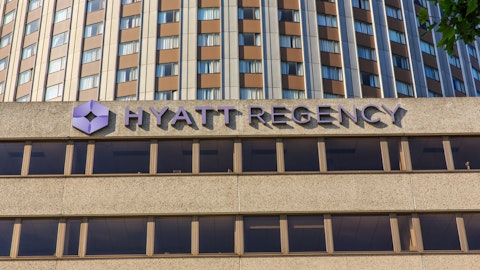Joan Bottarini: I would say, Stephen, that we are making great progress and in part due to the great performance, our great EBITDA performance and we’ve said on a growth basis that we’re targeting about 3% to 3.5%. So there’s different measurements for that leverage ratios that we’re managing with our investment grade profile. So that is our commitment. And as we generate more cash flow, we’ll have more investments to be able to make decisions about how to invest back into the business and return capital to shareholders when appropriate.
Mark Hoplamazian: I would just add, we talk about mix, earnings mix, and we talk about free cash flow. Just pay attention to the fact that 100% of reported adjusted EBITDA plus net deferrals plus finance contracts from ALG converts to cash. So the cash conversion effectively is 100%. There maybe timing differences to working capital that carries over, but working capital is net zero over the course of any 12 month period. Secondly, our cash conversion is a net cash flow from legacy Hyatt is rising. Our franchise proportion is increasing. We’re increasing our franchise base in Europe, in particular, and finding more and more opportunities on franchising in some other markets, notably South America. So I believe that you’ll see a growth in our franchise percentage over time.
We still are dominantly a managed business but I think franchise will be a grower. And secondly — and thirdly, rather, the CapEx carry for the portfolio is coming down and will continue to come down. So I think those are the key drivers to having great confidence that our cash position and cash generation has really been transformed already.
Operator: Our next question comes from Joe Greff from JPMorgan.
Joe Greff: Two comments on how you’re thinking about 2023. One, would you expect ALG to grow adjusted economic EBITDA year-over-year, given the onetime benefit of $27 million from the travel credit expirations?
Mark Hoplamazian: I think the short answer is no, because there is — that was a release of a liability. While it didn’t have a cash impact, it was a reduction in the liabilities that we took on when we bought the company. So from a valuation perspective, it is relevant that that got released because they lapsed. A lot of the settlement with travelers who had books holidays that were not able to be taken because of COVID were settled in travel credit. These travel credits actually expired. So that’s actually what gave rise to that. But when we bought the company, we were not just familiar with it, we took into account in the liabilities that we assumed. So effectively, we took on the liability that turned out to be — have no costs associated with it.
So while it wasn’t a cash benefit in the reported earnings, this is a GAAP geography issue. It was a pickup in sort of valuation, so to speak. But no, that’s a one-timer. Secondly, right now, we are assuming that the seasonality issues that Joan mentioned earlier will not look like they did in ’22, because it was exceptional that we filled in. And so we are basically expecting that we will return to a more normal seasonality effect. So for those reasons, I would say, no, we wouldn’t expect growth from the 22% level. Having said that, three things are true. First, the package RevPAR in January was up 42%, well ahead of our expectations, pacing for ALG is plus 30% for the year. Again, ahead of our expectations. And third, we’re growing, we’re adding properties.
So I think that there are offsets to some of the structural things that we’re expecting to impact ALG’s business. So I would say stay tuned. Right now, if things remain as robust as they started, we will be wrong about being able to grow from where we were in ’22. But it’s really too early to say. The booking window is less than 60 days or it’s about 60 days, I should say. So I would just say stay tuned, we’re going to be tracking this extremely closely.




